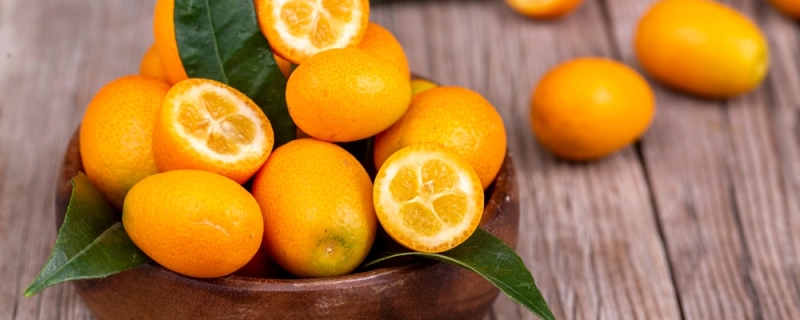Category: Fruits and Berries
Kumquat: Taste, Uses, and Benefits
Kumquat (Citrus japonica), a small, oval-shaped citrus fruit native to South Asia, is unique for its ability to be eaten whole—skin and all. Unlike most citrus fruits, the peel is sweet, while the flesh is tart and tangy. Often used in both fresh and preserved forms, kumquat is celebrated for its refreshing flavor and versatility in culinary applications.
What does Kumquat taste like?
Primary Flavor Characteristics
Kumquats have a sweet, edible peel and a tangy, slightly sour pulp. This duality creates a harmonious balance of sweetness and tartness, making kumquats a distinctive citrus fruit.
Aromatic and Taste Nuances
The aroma of kumquats is intensely citrusy, with floral and herbal undertones. The taste is a blend of bright tartness from the flesh and subtle sweetness from the peel.
Scientific Description of Taste and Aroma
- Aroma: Citrus-forward, floral, with hints of herbs.
- Taste: Sweet peel and tangy pulp with a mild bitterness.
- Texture: Juicy, with a slightly chewy peel and tiny edible seeds.

In-Depth Flavor Analysis of Kumquat
Underlying Flavor Notes
- Sweetness from Peel: The peel adds a mild, sugary sweetness that contrasts with the tart pulp.
- Tangy Flesh: The flesh delivers a burst of bright, sour citrus flavor.
- Bitterness: A slight bitterness from the oils in the peel enhances its complexity.
- Floral Undertones: Subtle floral notes make the flavor more aromatic and refined.
Impact of Preparation on Flavor
- Raw Kumquat: Provides a crisp, refreshing taste with a balance of sweet and sour.
- Cooked Kumquat: Cooking enhances sweetness while reducing tartness and bitterness.
- Candied or Preserved: Intensifies sweetness and softens the peel, creating a rich, chewy texture.
Textural Qualities
The combination of juicy pulp, firm peel, and edible seeds makes kumquat a texturally interesting fruit, perfect for a variety of culinary uses.
Culinary Uses of Kumquat
Primary Uses
- Fresh Eating: Kumquats can be eaten whole as a snack, offering a burst of contrasting flavors.
- Desserts: Sliced kumquats are used in cakes, pies, and sorbets for their tangy-sweet flavor.
- Preserves and Marmalades: Kumquats are ideal for making marmalades, jams, and candied fruits.
- Savory Dishes: Adds brightness to meat dishes, salads, and sauces for poultry or seafood.
- Beverages: Kumquats are used in cocktails, infused waters, and teas for their citrusy zest.
Ideal Pairings for Kumquat
- Spices: Ginger, cinnamon, and star anise enhance kumquat’s sweet-tart flavor.
- Herbs: Basil, mint, and thyme complement its floral and citrusy profile.
- Fruits: Pairs well with other citrus fruits like oranges and limes.
- Chocolate: Dark chocolate contrasts beautifully with kumquat’s tanginess.
- Dairy: Works well with creamy ingredients like yogurt, cream cheese, and mascarpone.
Health Benefits of Kumquat
Key Nutrients and Benefits
- Rich in Vitamin C: Supports immune health and helps combat oxidative stress.
- High in Fiber: The edible peel provides dietary fiber, aiding digestion and gut health.
- Antioxidant Properties: Contains flavonoids and other antioxidants that reduce inflammation.
- Low-Calorie Snack: Kumquats are nutrient-dense and low in calories, making them a healthy choice.
- Supports Heart Health: The potassium and fiber content may help regulate blood pressure and cholesterol.
Potential Precautions
- Acidity: The high acidity may irritate sensitive stomachs if consumed in large quantities.
- Allergies: Rare but possible for individuals with citrus allergies.

Tips for Choosing and Storing Kumquat
How to Choose Quality Kumquats
- Color and Firmness: Look for bright orange kumquats that are firm and free from blemishes.
- Aroma: Fresh kumquats should have a strong, citrusy scent.
Storage Recommendations
- Refrigeration: Store in the refrigerator for up to two weeks to maintain freshness.
- Room Temperature: Can be kept at room temperature for a few days but should be consumed quickly.
- Freezing: Kumquats can be frozen whole for long-term storage.
Fun Facts About Kumquat
- Edible Skin: Unlike most citrus fruits, the sweet peel of kumquats is edible and highly flavorful.
- Symbol of Luck: In Chinese culture, kumquats are associated with prosperity and often gifted during Lunar New Year.
- Natural Hybrid: Kumquats are believed to be one of the oldest citrus hybrids, cultivated for centuries in Asia.